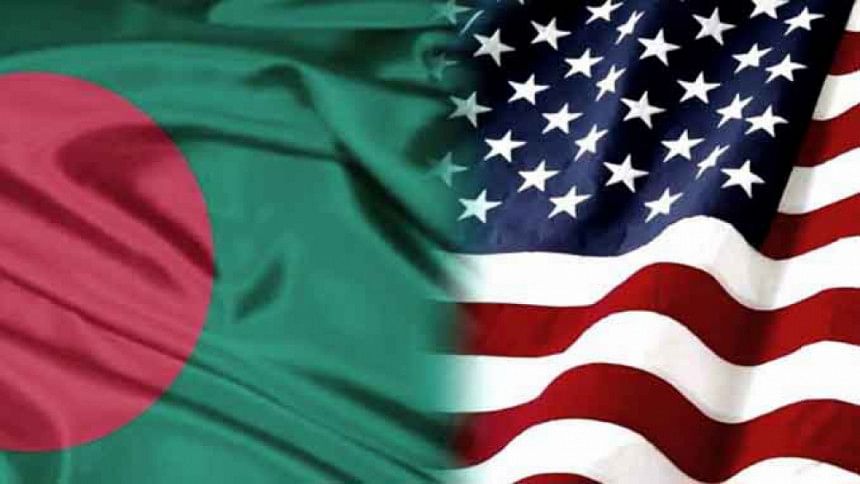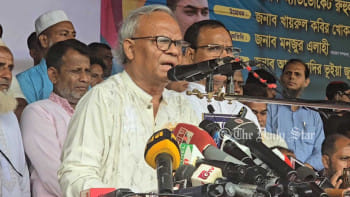US to closely watch polls in Bangladesh

The US will be keeping a close watch on the situation in Bangladesh ahead of the next national election, as the superpower wants to promote democratic governance and human rights, say foreign policy analysts.
They say the United States considers Bangladesh strategically important because of its location and maritime access, continuous economic development over the last few years, and the core values of democracy and secularism. That's why it is eager to engage deeply with the South Asian country in the years to come.
Eileen Laubacher, senior director for South Asia at the US National Security Council, completed a four-day visit to Bangladesh yesterday, while US Assistant Secretary for South and Central Asia Donald Lu will be visiting Dhaka on January 15-16.
Eileen visited Rohingya camps in Cox's Bazar, met Foreign Secretary Masud Bin Momen, PM's Security Adviser Major General (retired) Tarique Ahmed Siddique, participated in a roundtable with Bangladesh Institute of International and Strategic Studies and also met civil society leaders to discuss human rights, governance, and security in Bangladesh.
The visit underscored the US's continued commitment to strengthening Bangladesh-US bilateral relationship, said the US embassy in Dhaka yesterday.
Kara C McDonald, US deputy assistant secretary for democracy, human rights and labour, is likely to visit Bangladesh next month. More visits from the US are also likely in the coming months.
There is a general question as to why so many US officials are visiting Bangladesh. The curiosity is more as there were some strains in Dhaka-Washington ties following the sanctions on Rapid Action Battalion and seven of its current and former officials in December 2021. Also, Bangladesh was not invited to US President Joe Biden's democracy summit that month.
Last month, US Ambassador in Dhaka Peter Haas raised security concerns after members of Mayer Kanna, a platform of relatives of some victims of court-martial during the rule of late president Ziaur Rahman, allegedly interrupted his meeting with the victims of enforced disappearances at the capital's Shaheenbagh home of missing BNP leader Sajedul Islam Sumon.
Asked about the matters, former foreign secretary Touhid Hossain said it is quite normal that the western countries, especially the US, will speak about election, democracy and human rights.
"As this is an election year in Bangladesh, the words 'democracy' and 'election' will be pronounced more than normal," he said.
This is more so because the last two national elections were questionable, and the US does not want a similar type of election this time too, he added.
Bangladesh Enterprise Institute President M Humayun Kabir said the US officials during their visits to Bangladesh usually don't make direct statements on human rights and democracy.
"But if you look at the State Department spokesperson … he clearly said they will be closely watching the elections and if the government's words on fair polls matched the reality," said Humayun, also a former ambassador.
Foreign policy analysts said the US has a greater vision of drawing Bangladesh on its side as the global polarisation between the West and China-Russia bloc sharpened following the Russia-Ukraine war.
"If you look at South Asia, Bangladesh, after India, is the only country having robust economic growth and maintaining balanced foreign policy with regard to China and Russia," a western diplomat said.
Though India is a US ally, it continues to buy energy from Russia defying US sanctions, which irked the US. The US wants to strengthen partnership with other regional countries like Bangladesh, he said.
Humayun Kabir said the US-Bangladesh economic relationship is very vibrant with US imports from Bangladesh, people-to-people contact and remittance from the US. Bangladesh is a highly potential market for the US, he added.
America, Humayun said, also wants to strengthen partnership with Bangladesh for its vision of a secure and free Indo-Pacific so that no particular country can establish dominance in the sea.
Asked if the US is pushing for defence purchase, the former diplomat said Washington is already providing support in maritime security and there is nothing wrong if Dhaka buys equipment for enhancing its capacity, not for any confrontation. Getting involved in any military competition is also not the policy of Bangladesh, he said.
It will be fine as long as Bangladesh doesn't do anything that would pose a security threat to the US. So, there is need for nuanced approach to diplomacy, Humayun said.
Touhid Hossain said foreign countries, especially the western nations, will continue to speak out about democracy and human rights as long as scopes are created for them. If those issues are addressed internally, foreigners will not have much to say.
Prof Imtiaz Ahmed of Dhaka University thinks that trade is a major element in the US-Bangladesh relations. Bangladesh has maintained regime stability, if not political stability, for more than the last one decade and the trade ties with the US improved a lot, he said.
"US officials coming to Bangladesh means they are eager to deepen engagement. We need to realise our potentials and make the best use of it, instead of focusing on negative aspects," said the international relations professor.

 For all latest news, follow The Daily Star's Google News channel.
For all latest news, follow The Daily Star's Google News channel. 



Comments